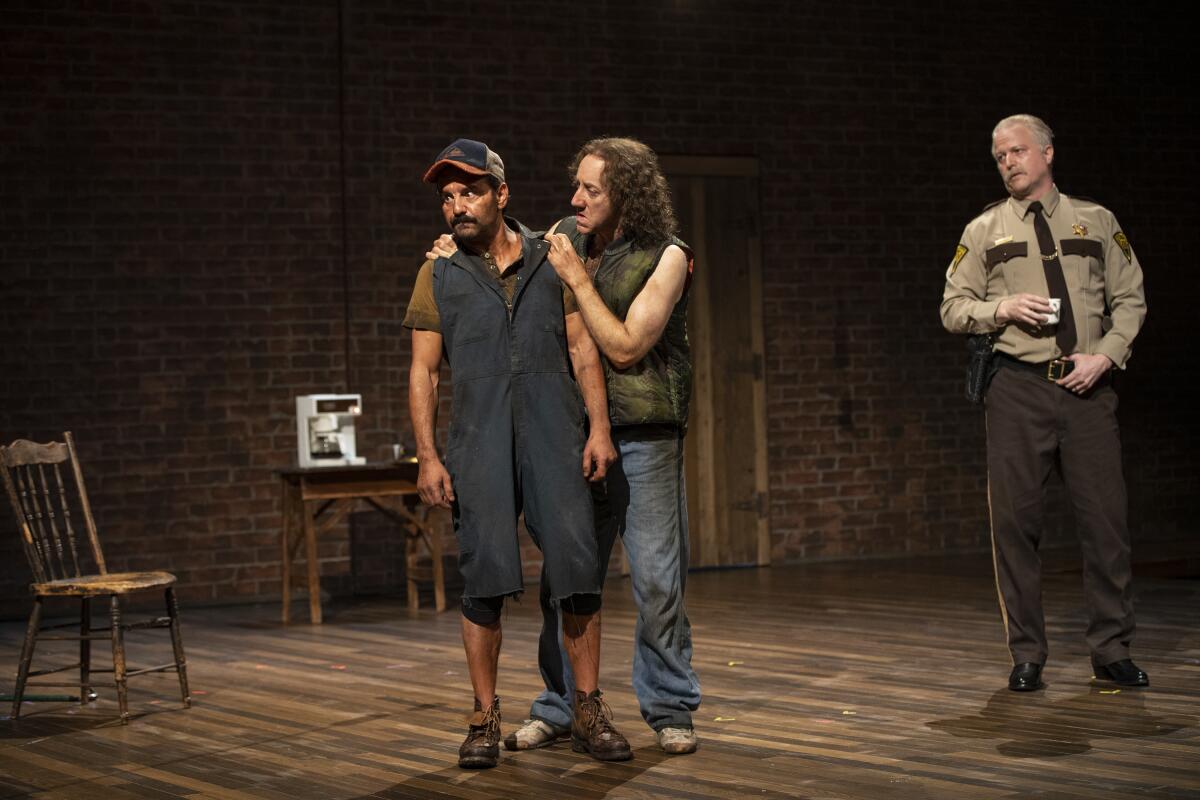Ethan Coen lifts the curtain on ‘A Play Is a Poem,’ but there’s no rhyme, no reason

- Share via
Ethan Coen, one half of the Oscar-winning filmmaking duo known as the Coen brothers, has been active on several writing fronts. While collaborating with brother Joel on movies of bracing and, yes, often vexing originality, he has managed to knock out a collection of stories, two volumes of poetry and several sets of one-act plays.
The latest batch of dramatic hors d’oeuvres, “A Play Is a Poem,” opened Saturday at the Mark Taper Forum in a production directed by Neil Pepe, who has stood in (with less success) as Ethan’s Joel in the theater. Pepe, the artistic director of the Atlantic Theater Company, has directed Coen’s previous bills of one-acts and is bringing this forgettable platter of five trifles to New York next year.
As a form, the one-act is dismissed as minor, but the short play has been an important vehicle for innovation in the theater. In the hands of artistic visionaries such as Maurice Maeterlinck, Thornton Wilder, Samuel Beckett, Harold Pinter, Edward Albee, Adrienne Kennedy and Caryl Churchill, compression has been a spur to creative freedom and experiment.
Pinter’s playwriting career was jump-started by “The Room,” a short work pregnant with mystery and menace. But it wasn’t as if the one-act play was merely a steppingstone. Like his mentor Beckett, Pinter came to appreciate the power of distillation even more in his maturity, paring away all inessentials with a ruthlessness that became a mark of his poetic integrity.
Churchill is the reigning master of the brief play. “Escaped Alone,” a recent example, is a feat of reengineering so breathtaking that whole narrative worlds are imbued in the interstices of this talking mosaic.
All of this is to say that a play can indeed be poem. But “A Play Is a Poem” is a pretentious title for such hackwork. Coen writes one-acts in the hoary tradition of vignettes, sketches, curtain-raisers. The closest these five playlets come to Beckett is in the refusal of meaning to turn up. Were it not for the filmmaking allure of the Coen name, it’s hard to imagine the Taper bothering at all with these exercises in artistic self-indulgence.
The production, an embarrassment of riches, cannot conceal the poverty of the playwriting. Singer-songwriter Nellie McKay enchants in her dreamy musical sequences that distract from the set changes with the sound of retro Americana given a moody modern gloss. But what does it say that I grew resentful whenever she stopped diverting me from the tedium of the writing?
The gathering of so much terrific acting talent for so little dramatic payoff struck me as some kind of casting savings plan — actors banking goodwill for a more significant Coen opportunity down the road. That’s a cynical take, but the lavishness wasted on “A Play Is a Poem” (when there are so many playwrights more deserving of a Taper production) is demoralizing.
Why couldn’t we be seeing Jackie Sibblies Drury’s Pulitzer Prize-winning “Fairview” or Clare Barron’s “Dance Nation,” or a bill of shorts by Churchill? Where is the literary discernment? Sure, Brad Pitt came to the premiere, but what’s the use of buzz if there’s nothing to back it up?
Filmmaker Ethan Coen talks about ‘A Play Is a Poem,” his collection of one-acts premiering at the Mark Taper Forum before its off-Broadway run.
David Mamet looms large in Coen’s theatrical imagination, but “The Redeemers,” the first piece in this disparate lineup, seems to be flirting with the male depravity of Sam Shepard’s unhinged late father-son plays. Two brothers (played by Max Casella and Joey Slotnick) have disposed of a body when a third brother (CJ Wilson) wearing a sheriff’s uniform inquires about the whereabouts of their old man.
I won’t spoil the ironic twist, but it did bring back a thought I had while watching the Coen brothers’ anthology film “The Ballad of Buster Scruggs.” So much screenwriting is resolved by a bullet. In the theater, where violence is of interest chiefly for its motives and aftermath, gunfire makes for a cheap ending.
But “The Redeemers” at least twinges with dark comic life. The focus on an especially loud coffeemaker during a tense standoff is classic Coen brothers in its mix of banality and imminent brutality. “At the Gazebo,” the third in the series, is by contrast completely lifeless.
Not that I wasn’t momentarily arrested by the dashing, poetry-reciting Carter (Sam Vartholomeos), back from Paris and full of new ideas that Dorothy (Micaela Diamond), a conventional-minded Southern belle, finds dangerous. But Coen’s tentativeness fails to raise the dramatic stakes.
A third character, a black servant named Gadsden (Ro Boddie), who waits on Carter and feeds him information on Dorothy’s male connections, is brought into the picture. But indirection turns subtlety into stupefaction. Why has Coen thrust us into a world he barely seems to know himself? How can we care about characters who are only dimly perceived by their author? These questions dead-end in a long, weary sigh.
Fall theater season highlights for Los Angeles include a musical version of “Almost Famous,” Bill Irwin in “On Beckett,” a revival of August Wilson’s “Jitney” and a new stand-up show by comic Mike Birbiglia.
“A Tough Case,” the second piece, is set in a more congenial Coen milieu: a shabby private detective agency. But the work, a low-boil film noir sitcom, suffers from a similar aimlessness. Ed Curtin (Slotnick) takes on a new partner after his former associate was shot for tailing a client’s wife “a little too close.” The joke is that Don Baines (Wilson), the new recruit, is completely clueless, unable to find the right door or register an innuendo, never mind operate undercover.
But a promising comic idea turns into flimsy sketch that doesn’t so much develop as shift restlessly. Coen has trouble sustaining a dramatic line in these short plays. While darting between characters, he toys distractedly with plot possibilities, few of which are adequately established.
Film allows situations to be set up visually. Riccardo Hernández’s scenic design makes the most of its minimal trappings, but the staging merely outlines what the author has yet to fill in himself. Coen’s instinct for quick cinematic scenes compounds the sketchiness.
Pastiche has been the Coen brothers’ stock-in-trade, but the conviction necessary to make a genre one’s own is lacking here. The curveball humor, Coen’s native gift, rarely feels sufficiently rooted. In the last two pieces, “Inside Talk,” a “Speed-the-Plow” knockoff, and “The Urbanes,” the story of a married cab driver in old New Yawk hustling to get his own medallion, the fabricated reality is on par with a slapdash cartoon.
“A Play Is a Poem” flits without purpose. These one-acts deserve to be swatted away.
'A Play Is a Poem'
Where: Mark Taper Forum, 135 N. Grand Ave., L.A.
When: 8 p.m. Tuesdays-Fridays, 2:30 and 8 p.m. Saturdays, 1 and 6:30 p.m. Sundays; ends Oct. 13 (call for exceptions)
Tickets: $40-$110 (subject to change)
Information: (213) 628-2772, centertheatregroup.org
Running time: 1 hour, 45 minutes, no intermission
More to Read
The biggest entertainment stories
Get our big stories about Hollywood, film, television, music, arts, culture and more right in your inbox as soon as they publish.
You may occasionally receive promotional content from the Los Angeles Times.












